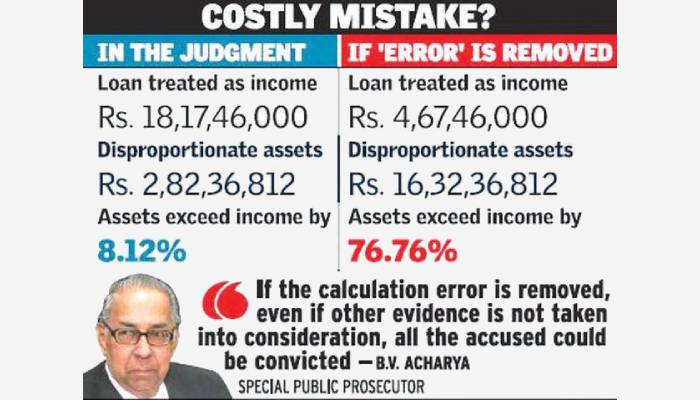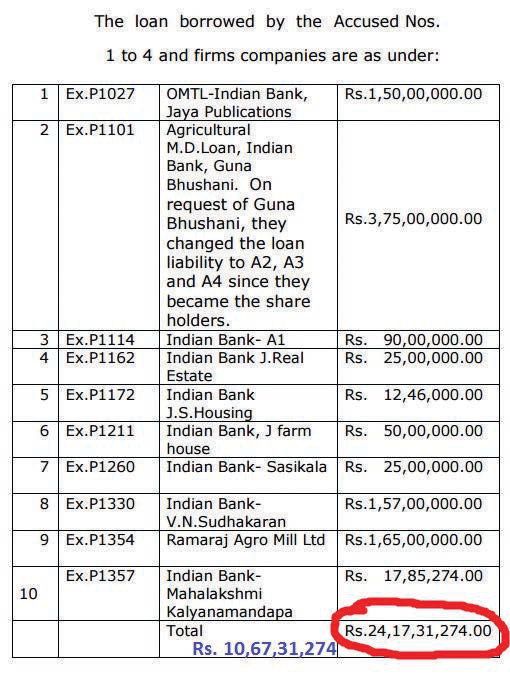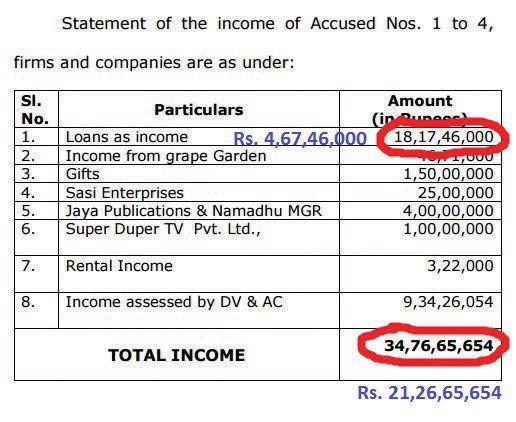
or

Karnataka High Court’s judgment in Jayalalithaa’s DA case has brought out the conflicting views of judiciary over the quantum of ‘corruption’. How much income is disproportionate income? Wherefrom came the so called precedent that 10 per cent DA is no crime? Read on to know more
In the judgment given by the Karnataka High Court in Jayalalithaa’s Disproportionate Assets Case, there is just one page that has become controversial today. Page number 852. The MLAs of Tamil Nadu are technically and legally free to elect J Jayalalitha as their leader and she can assume the Chief Ministership of the state also, because, as on today, she is not guilty of crime charged under Section 13(1)(e) of Prevention of Corruption Act, 1988. But the Special Public Prosecutor of the Karnataka Government has exposed a simple arithmetic issue in the judgment that has decided the qualification of leader of Tamil Nadu AIADMK legislature party to continue as MLA. The page number 852 of Judgment of Karnataka High Court has reversed the judgment of special Court in Benguluru which had convicted Jayalalitha in a corruption case, called Disproportionate Assets Case, meaning that the charge of holding assets disproportionate to known sources of legal income.

In this case, the calculation of loans of the accused is crucial in deciding the key question. Loan is considered as legal income in counting the value of the assets, which will go in favour of accused in the DA cases. There are ten entries of loans which should be added to arrive at income. While correct addition leads to total of Rs 10,67,31,274, the High Court calculated it to Rs 24,17,31,274. The difference between two is Rs 13.5 crore, which can reverse the acquittal.
The income assessed by the Investigating Agency is Rs . 5,99,85,274, which has to be deducted. Then the ‘balance loan amount’ mentioned in the judgment is Rs. 18,17,46,000. But removing the error it will be Rs. 4,67,46,000, that’s Rs. 4.76 crore. This error is carried on to page 913 and 914 where the income, expenditure, loans and assets were listed to calculate disproportionate income. In the “statement of income of accused” at the bottom of Page 913, the first head “loans as income” is Rs. 18,17,46,000, based on the error, if that error is removed the income should be Rs. 4.76 crore.
Thus the “Total Income” would be Rs. 21,26,65,654, and not Rs. Rs. 34,76,65,654. Further, in page no. 914, instead of Rs. 2,82,36,812 as disproportionate income, the total disproportionate income should be Rs 16, 32, 36, 812. To make it simple, disproportionate income calculated should not be Rs. 2.82 crore, but Rs. 16.32 crore.
The Karnataka High Court has judged the income of Jayalalitha, compared to the estimates of vigilance department which will explain how DA account is considered as less than 10 per cent of total income that ultimately led to decision of acquittal. Vigilance estimate total Rs. 37,59,02,466 minus Exaggerated Value (as considered by High Court) Rs. 34,76,65,654 = Rs 2,82,36,812 which amounts to 8.12% (Rs 2,82,36,812 x 100/34,76,65,654 = 8.12%).
But if the error is removed, the disproportionate income is Rs 16,32,36,812 which is 76.76 per cent excess, that means highly disproportionate.
Special Public Prosecutor B V Acharya said: “A glaring arithmetical error by the Karnataka High Court in computing the loans taken from banks by AIADMK general secretary Jayalalitha, her aides and their firms resulted in their acquittal.”
The value of disproportionate assets was Rs. 2.82 crore and this value was not enough to convict them on charges of corruption, said Justice C.R. Kumaraswamy of High Court in his verdict while disagreeing with the verdict of the Special Court, which had computed the value of DA at Rs. 53.6 crore.

Section 13 (1) (e) of the Prevention of Corruption Act of 1988 states: “A public servant is said to commit the offence of criminal misconduct, if he or any person on his behalf, is in possession or has, at any time during the period of his office, been in possession for which the public servant cannot satisfactorily account, of pecuniary resources or property disproportionate to his known sources of income.” It further explains “known sources of income” as “income received from any lawful source and such receipt has been intimated in accordance with the provisions of any law, rules or orders for the time being applicable to a public servant.”
What this means is that at any stage, a public servant should be able to prove that assets owned or controlled by him or her are attributable to proven, lawful sources. This law does not contain any exception that if the percentage of disproportion between known income and assets made is less than 10 per cent, it could be excused. Supreme Court in a case held that it was not reasonable to prosecute if that percentage is less than 10 per cent.
When Ms. Jayalalithaa was Chief Minister for the first time, between 1991 and 1996, she took a monthly salary of Re. 1 only. Her career as actor had ended in 1980, and seemed to yield no great savings or assets beyond her house in Poes Garden in Chennai. Sasikala and her family were accused of possessing property on Ms. Jayalalithaa’s behalf.
The liberal view of the High Court regarding the margin of DA raises the question whether quantum of corruption should decide the guilt of crime or the criminality behind abuse of authority as corruption. The judges in several cases explained that judging a disproportionate case is not a mere auditing affair. The accused cannot be acquitted solely because the disproportionate assets found are less than 10 per cent of their known sources of income. The judgments say courts should instead focus on the impact caused by corruption in society. The judges should remember what Justice Deepak Mishra said in April 27 order in SPP Bhavani Singh case. Asking the High Court judge to be vigilant about the “corroding effect of corruption” and the “gravity of the offence” against the accused in this case, the Bench said it was the duty of the judge to make a “complete and comprehensive evaluation and appreciation of the evidence in its entirety before rendering his judgment”. The Bench advised the High Court to “dispassionately render a judgment which is objectively and resolutely expressed”.
There are two contradictory views expressed by the honourable judges. The SC judgment in Krishnanand Agnihotri case of 1977 formed the basis of Karnataka High Court’s acquittal of Jaya. In this case the concept that disproportionate asset to the extent of 10 per cent deserves no punishment was brought in. This view was confirmed in Maharashtra v. Pollonji Darabshaw Daruwalla in 1987 where in SC said that when there was only a marginal excess in assets, the accused should be given the “benefit of the doubt”. Benefit of doubt is the principle of criminal justice which should help the accused to escape. Another concept of standard of proof of criminality is ‘preponderance of probability’ which was used in State of Maharashtra v. Wasudeo Ramchandra Kaidalwar in 1981. The Supreme Court said all that the accused needed to show was a “preponderance of probability” that he could come into possession of the assets under question in a legal fashion. There is yet another judgment in 2005 again by Supreme Court in Anantha Ramulu v. State of Madhya Pradesh. It was Justice Markandeya Katju who dismissed a case of corruption against a government official who was found in possession of Rs. 2.63 lakh in excess of his known income, saying if this was the case, every government official would find himself in jail. But the Judgment of Madhya Pradesh High Court in 2011 in the Kamal Lal Gharde presented a different view against tolerance of corruption. Quoting the Ramulu and Polloji verdicts of the Supreme Court, a Division Bench of the High Court said the question of disproportionate being meager or moderate deserved to be ignored as a probable fault of calculation.
The question is: Whether the policy of Indian Government and Judiciary is zero tolerance of corruption, or ten per cent tolerance?
The appointment of the SPP Bhavani Singh was challenged by DMK leader K.Anbazhagan on the grounds that the accused was in collusion with the Special Public Prosecutor. Karnataka Government rejected that petition, and he came in appeal to Supreme Court.
The Supreme Court on April 27, 2015 struck down the appointment of Special Public Prosecutor Bhavani Singh and declared that the interference of the Tamil Nadu government in his appointment was a manifestation of the government’s “anxiety” about the future. The court held that Karnataka is the sole prosecuting agency in the pending appeals filed by the former Tamil Nadu Chief Minister, Jayalalithaa, and three others against their conviction in the Rs. 66 crore disproportionate assets case. A three-judge bench struck down the appointment of Bhavani Singh as he was appointed to prosecute only in special court. Justice Deepak Misra read out from the verdict in the open court, “We have not agreed with Justice Madan Lokur. There is no justification for fresh hearing, especially when the appeals have been heard at length and judgment is reserved. “
Supreme Court had fixed May 12 as deadline for High Court to deliver judgment. Not only that, SC had also directed Karnataka to file its written submissions as prosecuting agency before the High Court by April 28, 2015, that too, in not more than 50 pages, would be considered by the High Court judge before the judgment on the appeals. When bail was granted to accused, the Supreme Court cautioned against delay tactics and warned not to take more than three months in High Court. As the SPP’s appointment was cancelled and B V Acharya was appointed as new SPP he got only one day to make submissions on behalf of Karnataka State. B V Acharya said: “The entire appeal proceedings were conducted without making Karnataka State a party, though it was a necessary legal requirement,” he said. “Counsel for the accused were allowed to make oral arguments for nearly two months, but no prosecutor authorised by Karnataka was present during such arguments.” He pointed out that the Apex Court itself had declared the appointment of G. Bhavani Singh as SPP by Tamil Nadu illegal and asked the High Court to ignore his submissions. The Supreme Court gave the Karnataka government only a day’s time to file a written statement. “We were denied permission to make oral arguments which were crucial,” Mr. Acharya said. The principles of natural justice were denied to the prosecution during the appeal proceedings. Should we not hear the two sides, and why state should not be heard?
It gives an impression that the judgment was an auditing affair that too suffered with severe arithmetic mistake. What message do we give to all the chief ministers, their friends and all political leaders and through them to entire public servants of this country? Should they spend lavishly on marriages of their progeny, make assets beyond known income up to 10 percent or 20 per cent, as per AP Government circular? Why should a revenue inspector or traffic-inspector be prosecuted for a small bribe? Shall we exempt corruption up to a few crore of Rupees?
Madabhushi Sridhar is Professor and Coordinator, Center for Media Law & Public Policy, NALSAR University of Law, Hyderabad.

Lex Witness Bureau

Lex Witness Bureau

For over 10 years, since its inception in 2009 as a monthly, Lex Witness has become India’s most credible platform for the legal luminaries to opine, comment and share their views. more...
Connect Us:


The Grand Masters - A Corporate Counsel Legal Best Practices Summit Series
www.grandmasters.in | 8 Years & Counting
The Real Estate & Construction Legal Summit
www.rcls.in | 8 Years & Counting
The Information Technology Legal Summit
www.itlegalsummit.com | 8 Years & Counting
The Banking & Finance Legal Summit
www.bfls.in | 8 Years & Counting
The Media, Advertising and Entertainment Legal Summit
www.maels.in | 8 Years & Counting
The Pharma Legal & Compliance Summit
www.plcs.co.in | 8 Years & Counting
We at Lex Witness strategically assist firms in reaching out to the relevant audience sets through various knowledge sharing initiatives. Here are some more info decks for you to know us better.
Copyright © 2020 Lex Witness - India's 1st Magazine on Legal & Corporate Affairs Rights of Admission Reserved